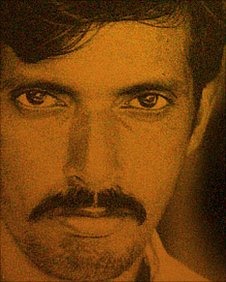 The family of a BBC journalist murdered in Sri Lanka 10 years ago have expressed anger over the failure of police to find those responsible for his murder.
The family of a BBC journalist murdered in Sri Lanka 10 years ago have expressed anger over the failure of police to find those responsible for his murder.
Mylvaganam Nimalarajan was killed by unidentified gunmen in his home in the northern town of Jaffna on 19 October 2000.
Activists accused a pro-government Tamil military group of being behind the murder but it has denied being responsible.
Nimalarajan’s father, G Mylvaganam, told the BBC Sinhala service from his home in Canada that criminal impunity was still the order of the day in Jaffna.
"The people who are responsible for his murder are now in this government. As a result, this government will also do nothing to find the killers," he said.
Nimalarajan was possibly the only independent journalist reporting from war-torn Jaffna, and was well-known for his coverage of the Sri Lankan separatist war.
Although the situation in the region had become increasingly tense and dangerous in 2000, he continued to report on the war, human rights abuses and political activities in the Jaffna peninsula.
‘Total impunity’
He was at home when two men burst into the house.
They killed him with five shots and attacked his father with a knife. They also threw a grenade, badly injuring his mother and nephew.
The journalist – who worked for both the BBC’s Sinhala and Tamil language services as well as other media outlets – had been reporting on violence that marred general elections on 10 October.
The Eelam People’s Democratic party (EPDP), the Tamil militant group which is now a political party, was accused in his reports of vote-rigging and human rights violations.
Media watchdogs also accused the EPDP, headed by Minister Douglas Devananda, of being responsible for the killing to stop similar reports and to intimidate local journalists. He has always denied the allegations.
After the murder, Nimalarajan’s family fled the country.
"For the last 10 years, no one reported the sufferings of the people of Jaffna like Nimalarajan did. They were understandably afraid to talk to the media," his father said.
"The killers wanted to silence the only independent voice coming from Jaffna. They won by killing my son."
The head of the BBC’s Sinhala service, Priyath Liyanage, says that the silencing of Nimalarajan created a huge void in the coverage of events in the north of Sri Lanka.
"Since his death, there had been no-one able to provide the outside world with the real story of the people of Jaffna. He was a very brave journalist," he said.
"I am honoured to be a colleague of his. It is a cause for great distress that, 10 years later, no-one had been brought to justice for his killing. His killers are still at large operating with total impunity."
Some arrests in relation to the case were recently made, but the suspects were released on bail and are believed to have left Sri Lanka.
Ten years on, no-one looks likely to be charged for the crime.
‘Symbolic cases’
International media groups have criticised the silence of Sri Lanka’s international donors in relation to the case.
The International Federation of Journalists (IFJ) says donors should put pressure on the government to improve press freedom, as well as democracy in general, as a pre-condition for their support to rebuild the war-ravaged country.
IFJ general secretary Aidan White told the BBC’s Sinha la service that the International Monetary Fund (IMF) was particularly at fault because it provided a bail-out package to Sri Lanka.
"I regret very much that the IMF and other financial institutions are not giving enough priority to the need to protect fundamental rights and democratic institutions – particularly the rights of journalists and the media," he said.
The IMF told the BBC it "cares deeply" about humanitarian issues but that it decided "exclusively on economic grounds" whether or not to lend to a country.
"In our view, there are other international fora in which humanitarian issues are better addressed," a spokesperson said.
The exiled journalists’ organisation – Journalists for Democracy in Sri Lanka – has also said that it regrets the fact that international organisations provide financial assistance to Sri Lanka even though Colombo has not taken any productive measures to address the issue.
The Paris-based Reporters without Borders (RSF) meanwhile has urged the government to restore accountability.
RSF’s Vincent Brossel told the BBC’s Sinhala service that it is important for the government to start with "symbolic cases" such as the killing of Mr Nimalarajan.
Only by embarking on that process, he argues, can the wounds of war be healed.
(For updates you can share with your friends, follow TNN on Facebook and Twitter )
